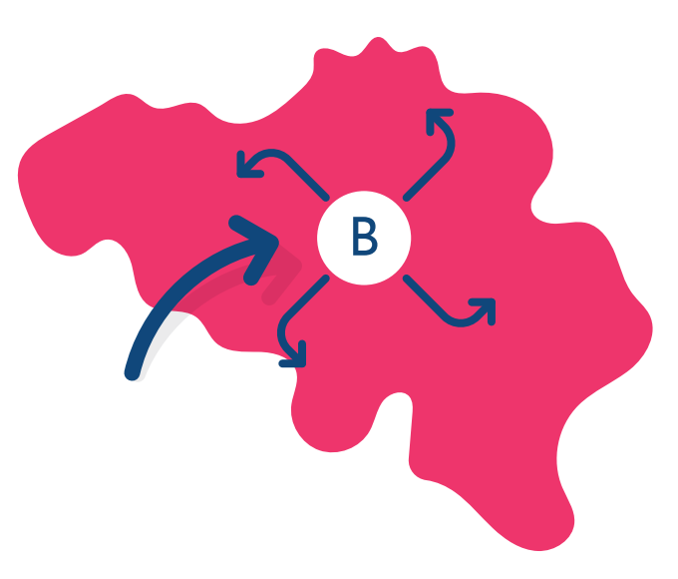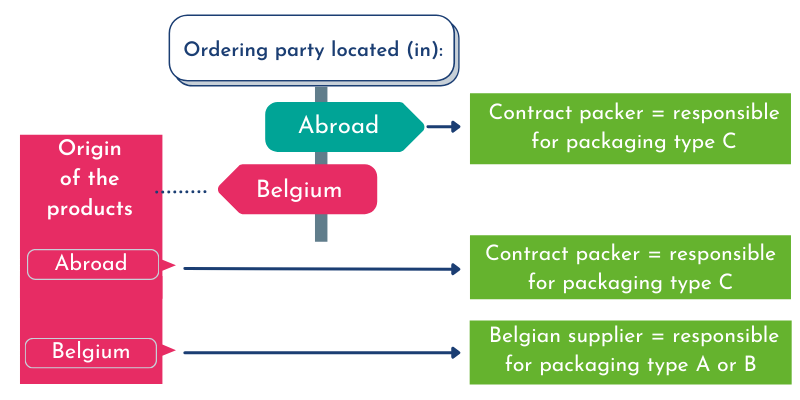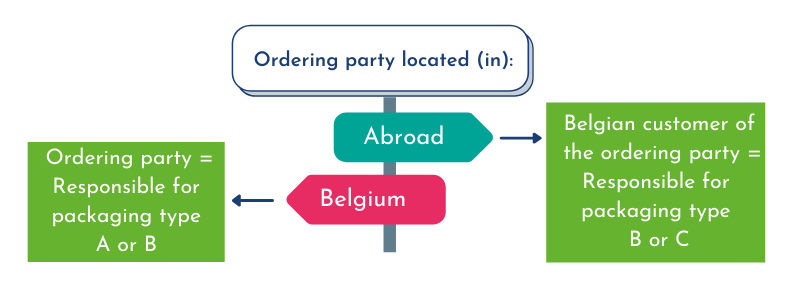Declaration guide
Any company placing packaging on the Belgian market is considered responsible for packaging.
The legislation identifies 4 types of parties responsible for packaging, depending on the activity of the company.
Those responsible for packaging type A
You package, or have goods packaged, for the purpose of placing them on the Belgian market.
Example: you are a producer of non-alcoholic beverages which you market in Belgium. You use different types of packaging to package these beverages: cans, bottles, plastic film as grouped packaging, cardboard dividers to store them on the pallet, etc. For all this packaging, you are responsible for packaging type A.

Those responsible for packaging type B
You import or have packaged goods imported with a view to placing them on the Belgian market. You do not unpack or consume the goods yourself. As the first importer, you are responsible for packaging type B. This also applies if you have the goods delivered directly to your clients.
Example: you are a building materials retailer and import tiles from Italy. These tiles are shipped in a wooden crate. Upon receipt, the crate is sold to a contractor in its entirety. The packaging around these tiles (the crate and any other possible protective packaging) falls under your responsibility for packaging type B.

Those responsible for packaging type C
You import packaged goods which you unpack and/or consume on Belgian territory. Packaging becomes waste in your company.
Example: you run a garage specialising in old cars. You buy spare parts for these cars abroad. These parts are unpacked and used in your garage. Removed packaging becomes waste in your company. For all this packaging, you are responsible for packaging type C.

Those responsible for packaging type D
You manufacture or import service packaging. Service packaging is packaging used at the point where goods and services are made available to consumers (e.g. pizza boxes, bags for chips, bags for bread, etc.). This packaging must be declared to Fost Plus.
A company can also meet several types of packaging responsibility.
Example:
Your company is a machine parts distributor. You import the packaged parts from China. The parts are individually packed in cardboard boxes. These boxes are packed in a larger cardboard crate in batches of ten. 20 of these crates are stacked on a wooden pallet and wrapped in stretch plastic film for safe transport. One of your customers orders entire pallets of one part type. You can therefore deliver these pallets directly to the customer without unpacking them.
All the other clients order a number of parts of different types. For this, you unpack the pallets and crates required, put together the specific order and repack everything to ensure smooth delivery to your customer.
Your company is then simultaneously responsible for packaging type A, type B and type C
- Type A for packaging you use to package the end customer’s specific order.
- Type B for pallets (as well as stretch film and cardboard crates) which are sold in full to the customer.
- Type C for pallets, stretch film and crates which you unpack in order to put together specific orders.
Exceptions
Private label
Private label is a concept whereby a company manufactures products, but packages them according to the customer’s instructions. The products are marketed under the customer’s label.
As a producer of private label products, you are not responsible for the packaging used for these products. You therefore do not have to declare them under packaging responsibility type A.
In this case, the customer who gives the instructions on the packaging to be used and who markets the products on the Belgian market is the party responsible for packaging. He will declare this packaging under packaging responsibility type A (if he has the packaging performed in Belgium) or type B (if he has the packaging performed abroad).
Contract packing
You are a contract packer if you unpack, pack or repack products on behalf of another company. You only provide services involving the storage, unpacking, repacking and delivery of goods to the final destination. You never become the owner of the goods.
In the case of contract packing, a distinction must be drawn between:
- packaging of products which the contract packer unpacks
- packaging used by the contract packer to repackage goods.
Packaging which the contract packer unpacks
The region where the ordering party is located will determine who is responsible for the packaging of the products that you unpack.
- Is the ordering party located abroad? As a contract packer, you are responsible for packaging type C.
- Is the ordering party located in Belgium? Then there are two scenarios:
- The goods come from abroad: as a contract packer, you are responsible for packaging type C;
- The goods come from Belgium: the Belgian supplier is responsible for packaging type A or type B.

Packaging used by the contract packer to repackage goods
As a contract packer, you never have packaging responsibility for the packaging of the final product which you add on behalf of your client (the ordering party).
As a Belgian ordering party, you have packaging responsibility for the packaging of finished products placed on the Belgian market. You are also responsible for the packaging of the packaged products which you import and have delivered to the Belgian market by the contract packer.

The Interregional Packaging Commission (IRPC) has also prepared a document which explains the definition of a contract packer as well as the aspects of packaging responsibility which apply to the contract packer. However, this regulation is quite complex. If you have any questions about this, do not hesitate to contact our advisors for an analysis of your company’s situation.